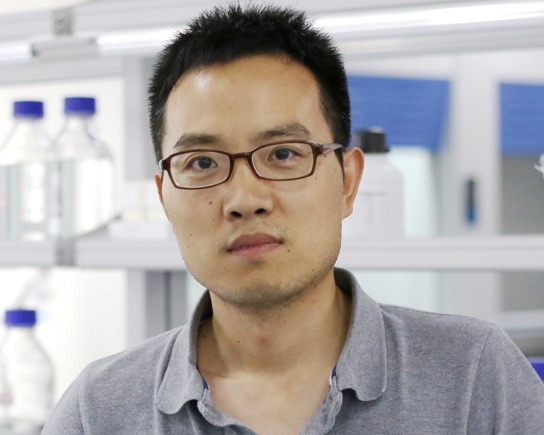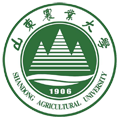
一、个人简介
崔海涛,山东农业大学,教授,博士生导师,“闽江学者”特聘教授。中国热带作物学会青年工作委员会副主任。
2009年毕业于中科院遗传与发育生物学研究所,获得博士学位。2011-2016年在德国马普植物育种研究所从事博士后研究工作(获德国洪堡博士后基金)。2017年2月至2023年8月,在福建农林大学海峡联合研究院,植物免疫中心任副主任。2023年9月至今,山东农业大学植物保护学院,教授。
先后主持国家自然科学基金面上项目2项,福建省自然科学基金面上项目1项,重点项目1项;作为合作方负责人,获中央引导地方科技发展资金专项1项,中德合作交流项目1项;在《Cell Host & Microbe》、《Molecular Plant》、《New Phytologist》和《Annual Review of Plant Biology》等著名国际学术期刊发表SCI论文20余篇,其中第一作者或通讯作者论文15篇(包括高被引论文4篇),论文累计被引超900次;国家专利2项。
二、研究方向:
1. 植物的抗病分子机理研究。以模式植物拟南芥,和作物水稻为研究对象,深入研究重要免疫调控蛋白EDS1/PAD4的生化和分子机制;位于细胞膜上的成孔蛋白在调控植物免疫中的作用机制;研究和挖掘新的抗性基因,研究其分子作用机理,揭示植物免疫领域的前沿科学问题。
2. 水稻与稻瘟病菌的互作机制研究。稻瘟病是水稻生产上的首要病害,我们通过转录组学,蛋白组学,和反向遗传学,得到了一些调控水稻抗稻瘟病的新基因,通过过分子生物学,细胞生物学和生物化学等手段,深入研究水稻与稻瘟病菌互作的分子机制。
3. 镰刀真菌的致病机理研究。镰刀菌是引起很多作物重要病害的病原真菌,比如小麦茎腐病、玉米茎腐病和香蕉枯萎病等。我们通过比较基因组,现代转录组和分子生化技术,深入研究镰刀菌的毒性分子机制,与寄主互作的分子机制,为防治镰刀真菌病害和作物抗病育种提供理论依据和新策略。
三、主持和参加科研项目
(1)国家自然科学基金委员会,面上项目,31970281,2020-2023,在研,主持
(2)国家自然科学基金委员会,面上项目,31770277,2018-2021,结题,主持
(3)福建省自然基金重点项目,2023J02011, 2023-2026,在研,主持
(4)福建省自然基金面上项目,2018J01609,2018-2021,结题,主持
(5)中央引导地方科技发展资金专项(广西),2021ZYZX1037,2022-2024,在研,合作方负责人
(6)中德科学中心,中德合作交流项目,M-0275,2021-2024,在研,主要参加人
(7)福建省“闽江学者”奖励计划,2018-2022,主持
四、发表论文
第一作者或通讯作者论文
1. Zeng, Y., Zheng, Z., Hessler, G., Zou, K., Leng, J., Bautor, J., Stuttmann, J., Xue, L., Parker, J.E., and Cui, H. (2023). Arabidopsis PAD4 promotes the maturation and nuclear accumulation of immune-related cysteine protease RD19. J Exp Bot. 10.1093/jxb/erad454. (IF=8)
2. Zhong, Z., Zhong, L., Zhu, X., Jiang, Y., Zheng, Y., Lan, T., and Cui, H. (2023). Transcription factor OsSPL10 interacts with OsJAmyb to regulate blast resistance in rice. The Crop Journal. 10.1016/j.cj.2023.10.015 (IF = 6.5)
3. Yu, D., Dong, X., Zou, K., Jiang, X.D., Sun, Y.B., Min, Z., Zhang, L.P., Cui, H., and Hu, J.Y. (2023). A hidden mutation in the seventh WD40-repeat of COP1 determines the early flowering trait in a set of Arabidopsis myc mutants. The Plant cell 35, 345-350. (IF = 12) (共同通讯)
4. Parker, J.E., Hessler, G., and Cui, H. (2022). A new biochemistry connecting pathogen detection to induced defense in plants. New Phytol. (IF = 10.32)
5. Ling, H., Fu, X., Huang, N., Zhong, Z., Su, W., Lin, W., Cui, H., and Que, Y. (2022). A sugarcane smut fungus effector simulates the host endogenous elicitor peptide to suppress plant immunity. New Phytol 233, 919-933. (IF = 10.32)
6. Zhao, C., Li, S., Du, C., Gao, H., Yang, D., Fu, G., and Cui, H. (2022). Establishment of a Protoplasts-Based Transient Expression System in Banana (Musa spp.). Agronomy 12, 2648
7. Yang, D., Li, S., Xiao, Y., Lu, L., Zheng, Z., Tang, D., and Cui, H. (2021). Transcriptome analysis of rice response to blast fungus identified core genes involved in immunity. Plant Cell Environ 44, 3103-3121. (IF = 7.9)
8. Zhao, C., Tang, Y., Wang, J., Zeng, Y., Sun, H., Zheng, Z., Su, R., Schneeberger, K., Parker, J.E., and Cui, H. (2021). A mis-regulated cyclic nucleotide-gated channel mediates cytosolic calcium elevation and activates immunity in Arabidopsis. New Phytol 230, 1078-1094. (IF = 10.32)
9. Leng, J., Tu, W., Hou, Y., and Cui, H. (2021). Temperature-Inducible Transgenic EDS1 and PAD4 in Arabidopsis Confer an Enhanced Disease Resistance at Elevated Temperature. Plants 10, 1258. (IF = 4.6)
10. Cui, H., J. Qiu, Y. Zhou, D. D. Bhandari, C. Zhao, J. Bautor and J. E. Parker (2018). Antagonism of Transcription Factor MYC2 by EDS1/PAD4 Complexes Bolsters Salicylic Acid Defense in Arabidopsis Effector-Triggered Immunity. Mol Plant 11(8): 1053-1066. (IF = 21.9)
11. Cui, H., Gobbato, E., Kracher, B., Qiu, J., Bautor, J., and Parker, J.E. (2017). A core function of EDS1 with PAD4 is to protect the salicylic acid defense sector in Arabidopsis immunity. New Phytol 213, 1802-1817. (IF = 10.32)
12. Cui, H., Tsuda, K., and Parker, J.E. (2015). Effector-triggered immunity: from pathogen perception to robust defense. Annual review of plant biology 66, 487-511. (IF = 28.3)
13. Cui, H., Y. Wang, L. Xue, J. Chu, C. Yan, J. Fu, M. Chen, R. W. Innes and J. M. Zhou (2010). Pseudomonas syringae effector protein AvrB perturbs Arabidopsis hormone signaling by activating MAP kinase 4. Cell Host Microbe 7(2): 164-175. (IF = 31.3)
14. Cui, H., T. Xiang and J. M. Zhou (2009). Plant immunity: a lesson from pathogenic bacterial effector proteins. Cell Microbiol 11(10): 1453-1461. (IF = 4.1)
15. Shang, Y., X. Li, H. Cui, P. He, R. Thilmony, S. Chintamanani, J. Zwiesler-Vollick, S. Gopalan, X. Tang and J. M. Zhou (2006). RAR1, a central player in plant immunity, is targeted by Pseudomonas syringae effector AvrB. Proc Natl Acad Sci U S A 103(50): 19200-19205. (共一作) (IF = 12.77)
共同作者论文:
1. Zhuo, T., Wang, X., Chen, Z., Cui, H., Zeng, Y., Chen, Y., Fan, X., Hu, X., and Zou, H. (2020). The Ralstonia solanacearum effector RipI induces a defence reaction by interacting with the bHLH93 transcription factor in Nicotiana benthamiana. Mol Plant Pathol 21, 999-1004.
2. Zhou, Y., Tergemina, E., Cui, H., Forderer, A., Hartwig, B., Velikkakam James, G., Schneeberger, K., and Turck, F. (2017). Ctf4-related protein recruits LHP1-PRC2 to maintain H3K27me3 levels in dividing cells in Arabidopsis thaliana. Proc Natl Acad Sci U S A 114, 4833-4838.
3. Mei, S., Hou, S., Cui, H., Feng, F., and Rong, W. (2016). Characterization of the interaction between Oidium heveae and Arabidopsis thaliana. Mol Plant Pathol 17, 1331-1343.
4. Xue, L., H, Cui., B. Buer, V. Vijayakumar, P. M. Delaux, S. Junkermann and M. Bucher (2015). Network of GRAS Transcription Factors Involved in the Control of Arbuscule Development in Lotus japonicus. Plant Physiol 167(3): 854-871.
5. Zhang, J., H. Lu, X. Li, Y. Li, H. Cui, C. K. Wen, X. Tang, Z. Su and J. M. Zhou (2010). Effector-triggered and pathogen-associated molecular pattern-triggered immunity differentially contribute to basal resistance to Pseudomonas syringae. Mol Plant Microbe Interact 23(7): 940-948
6. Chen, H., L. Xue, S. Chintamanani, H. Germain, H. Lin, H. Cui, R. Cai, J. Zuo, X. Tang, X. Li, H. Guo and J. M. Zhou (2009). ETHYLENE INSENSITIVE3 and ETHYLENE INSENSITIVE3-LIKE1 repress SALICYLIC ACID INDUCTION DEFICIENT2 expression to negatively regulate plant innate immunity in Arabidopsis. The Plant Cell 21(8): 2527-2540.
7. Zhang, J., F. Shao, Y. Li, H. Cui, L. Chen, H. Li, Y. Zou, C. Long, L. Lan, J. Chai, S. Chen, X. Tang and J. M. Zhou (2007). A Pseudomonas syringae effector inactivates MAPKs to suppress PAMP-induced immunity in plants. Cell Host Microbe 1(3): 175-185.、
五、联系方式:
电子邮箱:E-mail: haitao.cui@hotmail.com



